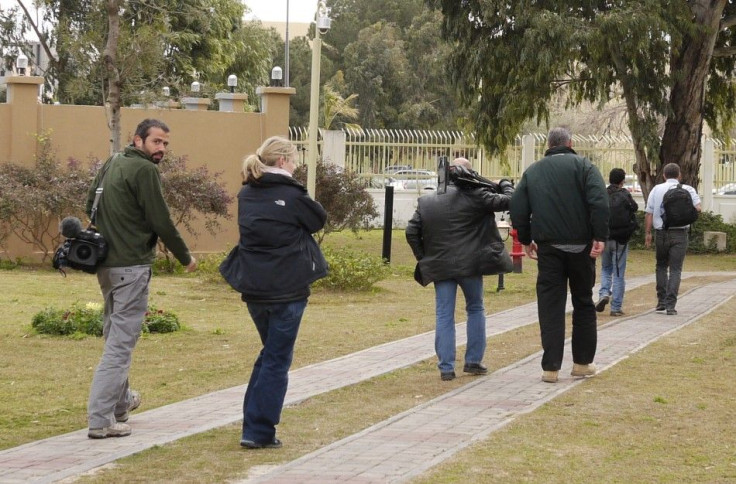Journalists targeted in Libya recall tales of harassment

International journalists continue to be targeted in the trouble-torn Middle East countries with the latest and the most extreme case coming from Libya, where BBC journalists had the first hand experience of Muammar Gaddafi regime's harassment of scribes.
BBC reported on Thursday that its team of reporters were detained and beaten up for 21 hours by Libyan forces.
They took everything, cameras, mobiles, asked for any memory cards and the bad thing was they asked 'whose gun is this in the car?', Feras Killani, a Palestinian refugee with a Syrian passport, recalled for BBC after flying out of Libya on Wednesday.
No, there was no gun in the car.
Feras, a journalist of Palestinian-Syrian origin for the BBC Arabic service, was with Chris Cobb-Smith, a British national, Goktay Koraltan, a Turkish national, when they were stopped at a checkpoint at Al-Zahra south of Zawiya on Monday, BBC reported.
Libya, which has a reputation of being hostile towards international media, took the step of inviting scribes to the country to prove that the atrocities being reported were exaggerated. The country plunged into a state of turmoil following the outbreak of anti-government protests after similar movements saw the ouster of authoritarian rulers in Tunisia and Egypt. The embattled Libyan leader Gaddaffi started facing the heat from international community after it was reported that the dictator was using forces to muzzle the protests, causing deaths and causalities. Reporters invited in to bust these stories of violence against the dissidents were assured that they can report freely.
The trio was interrogated by an officer who asked if they had permission to be reporting after being taken next to a barracks on the main highway, known locally as the kilometre 27 centre.
The Libyan officials tightened movements of reporters following a series of misguided steps, such as the instance of taking reporters to Zawiyah, which is still a rebel-stronghold. The BBC team has been talking to various media organizations recounting the tales of their capture ever since they flew out on Wednesday. Cameraman Koraltan, who spoke to The Telegraph, revealed that they feared they would be executed.
Libyan forces have been detaining scribes at checkpoints around Tripoli, including The Daily Telegraph's correspondent twice, The Telegraph added.
Journalists from across the globe cutting across several media organizations have been targeted increasingly in the Middle East in the wake of the wave of protests. From CBS' Lara Logan's shocking sexual assault and CNN's Anderson Cooper's assault in Egypt to BBC Arabic correspondent Abdullah Ghorab and his cameraman's attack in Yemen.
The Committee to Protect Journalists (CPJ), which has been constantly decrying increasing number of assaults on reporters covering anti-government demonstrations in the Middle East, recently released a statement on the attacks on press in Libya, Yemen, and Egypt on March 9.
The independent New York-based nonprofit organization that promotes press freedom and defends the rights of journalists raised concern over attack on the Ouzo Hotel in the rebel-held city of Benghazi in eastern Libya on Tuesday. It cited international media reports to recall the instance unknown assailants throwing an explosive device into the hotel, which has been the primary residence for journalists in the city, in the early morning hours.
Foreign journalists have also been detained in various towns in Libya by the authorities; all were eventually released. In Yemen, a correspondent was attacked and threats were made against Al-Jazeera. In Egypt, officers beat and injured a local journalist, the CPJ added in the statement.
The following is a video of the victims describing the Libyan ordeal featured on The Telegraph:
© Copyright IBTimes 2024. All rights reserved.











